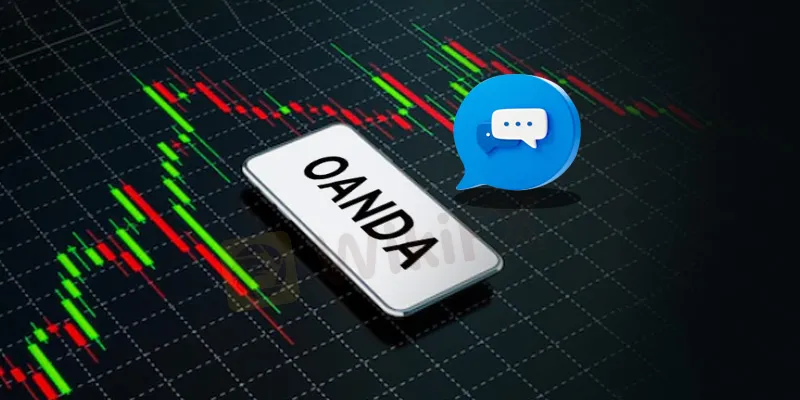简体中文
繁體中文
English
Pусский
日本語
ภาษาไทย
Tiếng Việt
Bahasa Indonesia
Español
हिन्दी
Filippiiniläinen
Français
Deutsch
Português
Türkçe
한국어
العربية
Clients Reviews: What Are Investors' Opinions of OANDA?
Abstract:Whether you prefer to trade stocks or currency trading appeals to you more, a prosperous trading journey involves choosing the right broker. A reliable broker doesn't always have to be strongly regulated. On the other hand, signing up with an offshore broker without regulatory oversight isn't recommended either. It's just that you need to be rational with broker selection. Sometimes, multi-regulated brokers like OANDA fail to meet clientele satisfaction.

Summary
OANDA Global Markets Ltd operates under the brand name of OANDA Corporation, founded in 1996. The group comprises several entities regulated in multiple jurisdictions around the world. With easy-to-use trading platforms, numerous account types, and a quality research department, the company claims to be one of the most competitive brokers in the industry. However, the broker is criticized for its slow withdrawal process, poor trading conditions, and high trading costs.
Is OANDA Regulated?
OANDA holds multiple regulations worldwide. Major regulators of the company include but are not limited to USA National Future Association (NFA), UK Financial Conduct Authority (FCA), Australian Securities and Investment Commission (ASIC), and Cyprus Securities and Exchange Commission (CySEC), Investment Industry Regulatory Organization of Canada (IIROC), British Virgin Islands Financial Services Commission (BVI-FSC) and Malta Financial Services Authority (MFSA) .

Clients Feedback
OANDA is mostly reported for withdrawal problems. However, clients have also denounced the company for worsened trading conditions and slow customer support. Some clients even perceive the company to be a dealing desk broker.

According to OANDA clients, the brokerage manipulates their orders before passing them to the market. Investors also accuse the company of not providing flexible charting time frames and advanced technical indicators. Other complaints include widened spreads, no negative balance protection, guaranteed stop-loss, etc.

Has OANDA Ever Been Red Listed by Regulators?
Malaysian Regulators once warned OANDA for providing trading activities without its approval. The company sometimes faces non-compliance issues as well. For instance, OANDA was penalized for $200,000 after NFA found the company in breach of conduct. According to the authority's press release dated April 01, 2021, the company failed to report accurate forex daily activities to the NFA.
Further, OANDA personnel did not adhere to the process and failed to notify OANDA's AML Compliance Officer after one of its customer's accounts got hacked.

Disclaimer:
The views in this article only represent the author's personal views, and do not constitute investment advice on this platform. This platform does not guarantee the accuracy, completeness and timeliness of the information in the article, and will not be liable for any loss caused by the use of or reliance on the information in the article.
Read more

INFINOX Partners with Acelerador Racing for Porsche Cup Brazil 2025
INFINOX has teamed up with Acelerador Racing, sponsoring an Acelerador Racing car in the Porsche Cup Brazil 2025. This partnership shows INFINOX’s strong support for motorsports, adding to its current sponsorship of the BWT Alpine F1 Team.

The Daily Habits of a Profitable Trader
Every professional trader follows a structured approach to ensure they are well-prepared, disciplined, and able to seize opportunities with confidence. Whether you are a seasoned investor or an aspiring trader, adhering to a robust daily checklist can significantly enhance your performance. Use this checklist to check if you are a qualified trader

The Impact of Interest Rate Decisions on the Forex Market
Interest rate changes determine currency attractiveness, influencing capital flows and exchange rate trends. Understanding this mechanism helps investors navigate the forex market effectively.

How a Housewife Lost RM288,235 in a Facebook Investment Scam
A 47-year-old housewife in Malaysia recently fell victim to an online investment scam, losing a substantial sum of RM288,235 after engaging with a fraudulent scheme advertised on Facebook.
WikiFX Broker
Latest News
TradingView Brings Live Market Charts to Telegram Users with New Mini App
Trump tariffs: How will India navigate a world on the brink of a trade war?
Interactive Brokers Launches Forecast Contracts in Canada for Market Predictions
Authorities Alert: MAS Impersonation Scam Hits Singapore
Stocks fall again as Trump tariff jitters continue
INFINOX Partners with Acelerador Racing for Porsche Cup Brazil 2025
Regulatory Failures Lead to $150,000 Fine for Thurston Springer
April Forex Trends: EUR/USD, GBP/USD, USD/JPY, AUD/USD, USD/CAD Insights
March Oil Production Declines: How Is the Market Reacting?
Georgia Man Charged in Danbury Kidnapping and Crypto Extortion Plot
Currency Calculator







